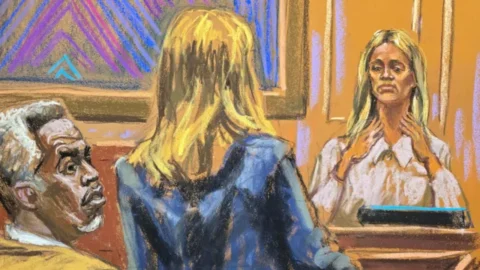Timi Dakolo and Apostle Lazarus have now reached an amicable resolution following a heated discussion over a sermon delivered by the cleric.
The controversy began when Apostle Lazarus projected an alleged invoice from a gospel singer, which outlined a $10,000 honorarium with a mandatory 50% non-refundable deposit. This claim sparked reactions, with Dakolo dismissing the authenticity of the invoice and cautioning the public against believing everything they see.
The singer insisted that if such an artist existed, they should be named rather than making generalized accusations. “Nigerians, you should not believe everything you see. Nobody has a 40-man crew in Nigeria. Name the artist in order to justify capping 😂,” Dakolo commented, making it clear that he found the claim exaggerated.
Unwilling to let the matter slide, Dakolo took things further by directly calling out Apostle Lazarus in a separate post. In his response, he highlighted what he perceived as hypocrisy, pointing out that the pastor himself charges fees for his school of ministry.
To support his argument, the singer shared screenshots of emails he had received upon applying to Lazarus’ school, which outlined a charge of $150 per student. “Sir, you are charging as low as $150 per person for your school of ministry, teaching and preaching Jesus. Probably having as much as 1,000 students. Let’s do the maths,” he wrote.
Dakolo further questioned the idea of having premium and standard categories in a religious setting, stating, “You even have premium and standard for God’s house? Are you not selling the gift and revelation freely given to you? Again, let’s not keep shifting the goalpost.”
After days of online discourse, Apostle Lazarus has now taken to social media to address the situation, posting a photo of himself, Timi Dakolo, and Apostle Iren. His caption suggested that both parties had come to a mutual understanding and that their discussion had been productive.
In a rare public acknowledgment of Dakolo’s concerns, the cleric wrote, “My brother @timidakolo is a music legend. Give him his flowers. What a man! He genuinely carries the burdens of musicians. His concerns are real. I love you.” The statement signaled a shift from the initial tension and recognized Dakolo’s advocacy for gospel artists and their rightful compensation.
Apostle Lazarus also took the opportunity to address the broader issues raised by Dakolo, emphasizing that both artists and hosts needed to do better. He acknowledged that pain exists both “from the pulpit to the pew” and reassured his audience that necessary changes would be made. “Better structures will be built. Pain is real. From pulpit to the pew, the pain is real, but we will be fine,” he wrote.
He further noted that the industry should work towards fairness and improvement, stating, “This generation will not have a carryover of pain. Hosts will do better. Guests will do better. We will have a better nation together.” His message suggested a commitment to addressing the grievances that had been raised, rather than dismissing them outright.
While Dakolo had previously clashed with Apostle Lazarus on the subject of gospel artists charging fees for ministrations, this exchange marked a significant moment as it was the first time the cleric publicly responded to him.
In his latest post, Lazarus maintained a conciliatory tone, indicating that he and Dakolo were able to find common ground. The inclusion of Apostle Iren in the photo added to the sense of unity, with Lazarus humorously stating, “I don’t know how to edit my brother @pst_iren out of the picture.”
This lighthearted remark reinforced the idea that their discussion had ultimately led to a positive resolution rather than deepening divisions.
The incident highlights ongoing conversations in Nigeria’s gospel music and religious communities regarding financial transparency and ethical considerations.
Dakolo’s outspokenness on the issue reflects a growing demand for accountability, while Lazarus’ response suggests a willingness to engage in dialogue and acknowledge different perspectives. As both parties move forward, the debate serves as a reminder that constructive discussions, even when contentious, can lead to meaningful progress.
Whether this resolution will lead to actual reforms in the way gospel artists and religious institutions operate remains to be seen, but for now, it appears that the conversation has been steered in a more positive direction.










